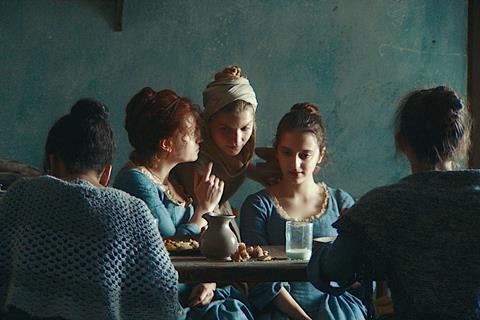A young woman finds her voice in an Italian musical institute at the turn of the 19th century

Dir: Margherita Vicario. Italy/Switz. 2024. 106mins
The directorial debut of Italian actress and singer-songwriter Margherita Vicario is a true crowdpleaser that looks set for a triumphal march on home ground when 01 Distribution rolls it out in Italy on April 11. With its winsome audiovisual appeal and stirring feminist pay-off, this period-set musical allegretto inspired by the largely forgotten female musicians of Venice’s orphanage-conservatories should charm other theatrical markets too – the film sold to several territories ahead of its Berlin premiere – all this despite the fact that it falls back on some of the cheaper tricks of the commedia all’italiana tradition.
Tinkers playfully with history to redress a patriarchal wrong
One would need a tough skin not to be won over by the mischievous musical anachronism at the heart of Gloria! and the chemistry of the young female cast that delivers it. Yet the screenplay positively embraces clichés, such as the crumpled, tossed paper sheets of a composer with musical writer’s block. That’s just a tiny example of the wider dramatic complacency of a film that nevertheless delivers a rousing parable of female solidarity, one whose fantastic nature is part of its point. Gloria! tinkers playfully with history to redress a patriarchal wrong.
The action is set in the religious institute of Sant’Ignazio, situated, according to an opening caption ’somewhere near Venice as the year 1800 dawns’. A closing caption provides the historical context: there were four such convent-conservatories in and around Venice, where orphaned or abandoned girls were taught to sing, sight read and play instruments by musical priests. (The most famous of these was Antonio Vivaldi, music master at the Ospedale della Pietà, whose music is sparingly but effectively used in the film). By 1800, however, the anti-clerical Napoleon controlled a huge swathe of northern and central Italy, and when he repressed the country’s religious orders in 1807, Venice’s charitable music schools closed for good.
A singer-songwriter with two albums to her name as well as a working actress, Vicario’s aim – stated in another final caption – is to give voice to all these talented young women, many of them composers, “who were written out of history”, while their male teachers left reams of sheet music for posterity. Into the void on the other side, Vicari drops an immodest proposal: what if pop music had been discovered by a group of musical orphans in a Venetian convent in the first months of the 19th century?
The film’s emotional centre of gravity is Teresa (an affecting Galatea Bellugi, also recently seen in The Taste Of Things), an apparently mute servant girl who is on the lowest rung of the ladder in this dilapidated convent-school. She skivvies for the musical signorinas of her own age who form the orchestra and choir, being bossed around in particular by catty but musically talented Lucia (Carlotta Gamba), first violin in the Sant’Ignazio ensemble.Teresa is also maltreated by music master Perlina (Italian comedian Paolo Rossi), whose bullying turns out to be connected with a dark secret in the girl’s past.
When a new-fangled instrument is donated to the convent by a famous German keyboard artisan, the craven Perlina consigns this ‘pianoforte’ to the cellars because it is seen as the work of the devil (why harpsichords and organs are exempt from this stain is never properly explained). The crabby musical priest is stressed because Pius VII – the only pope ever to be elected and crowned in Venice – is due to visit the convent, and he is tasked with writing new music for the occasion. But Perlina’s melodic mojo has gone – hence the crumpled paper missiles.
Teresa stumbles on the piano and, tentatively at first then more confidently, starts to play the music she has in her head – which is a million, jazzy miles from the still recognizably Baroque music the girls upstairs are making under Perlina’s irascible tutelage. When four of those girls invade Teresa’s cellar refuge, the stage is set for a musical duel between the old-school trills and fugues of Lucia – who has begun composing her own material – and Teresa’s self-taught Italian pop.
This potentially ridiculous musical stand-off is buoyed up by the sheer joy that these young women find in the act of creative self-affirmation as the animosity between Teresa and Lucia begin to turn to respect and friendship. It is a little disappointing that when the discovery is made that words can be sung over pianist Teresa’s syncopated rhythms and discords, the end result is the kind of sentimental Italian pop heard on the country’s airwaves. Deft editing and the sheer brio of the exercise keep us from wincing too much.
More problematic is the creakiness of the script when it leaves the cellar and manoeuvres the story towards that papal visit. Worst offender is a sub-plot about a wheedling, sponging young male friend of Perlina, which indulges in some pretty unreconstructed gay stereotypes.
Somehow, though, Gloria! keeps on charming us back, most notably in a musical girl-power explosion (it’s a shame that a couple of subsequent story-resolving endings are tacked on to dissipate the adrenalin). There’s period authenticity in the costumes and the worn, faded nobility of its convent setting, and beauty in a muted colour palette that is lifted only by the hopeful blue of the musicians’ and singers’ dresses. The calm waterscapes of the Venetian lagoon and hinterland provide for some atmospheric bridging scenes that serve to emphasise the isolation of this fragile haven.
Production company: Tempesta, Rai Cinema
International sales: Rai Cinema International, fulvio.firrito@raicinema.it
Producers: Valeria Jamonte, Manuela Melissano, Carlo Cresto-Dina
Screenplay: Anita Rivaroli, Margherita Vicario
Cinematography: Gianluca Rocco Palma
Production design: Luca Servino, Susanna Abenavoli
Editing: Christian Marsiglia
Music: Margherita Vicario, Davide Pavanello
Cast: Galatea Bellugi, Carlotta Gamba, Veronica Lucchesi, Maria Vittoria Dallasta, Sara Mafodda, Paolo Rossi, Elio, Vincenzo Crea, Natalino Balasso, Anita Kravos, Jasmin Mattei
























